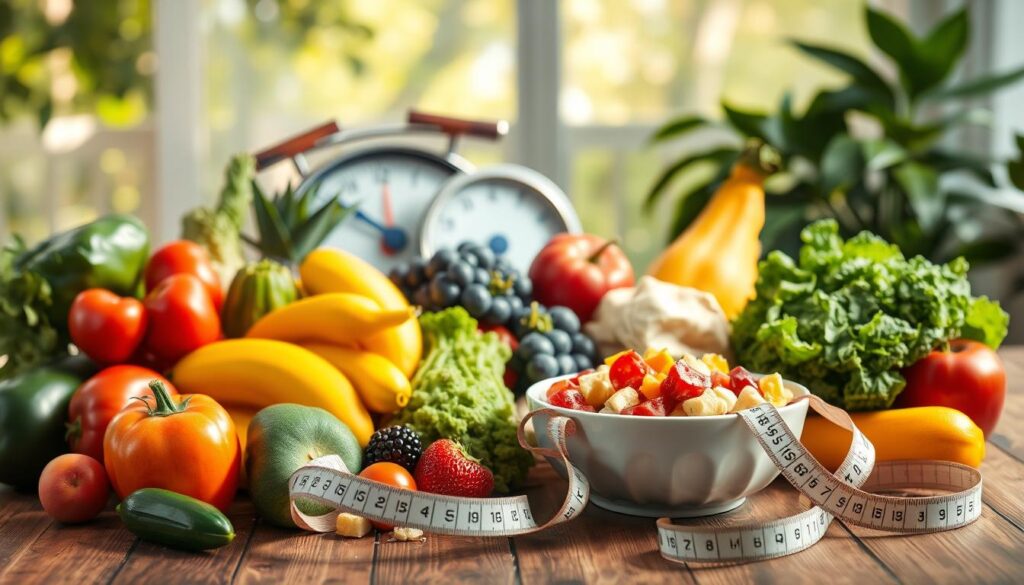Are you finding it hard to lose weight, even when you try your best? The secret to losing weight is a healthy, lasting eating plan. But with all the different advice out there, it’s hard to know where to begin. In this detailed guide, we’ll cover the basics of healthy eating for weight loss. We aim to help you make smart choices and reach your goals.
Key Takeaways
- Achieving a calorie deficit is the foundation of weight loss, but it’s vital to do so in a healthy, balanced way.
- Understanding the role of metabolism in weight management can help you create a personalized plan for sustainable results.
- Cultivating a positive mindset and setting realistic goals are essential for long-term success.
- Incorporating nutrient-dense foods, practicing portion control, and timing your meals can optimize your weight loss journey.
- Staying hydrated and developing mindful eating habits can further support your weight management efforts.
Ready to start a healthier, more fulfilling weight loss journey? Let’s explore the strategies that can help you achieve your goals while nourishing your body and mind.
Understanding Weight Loss Fundamentals
Weight loss isn’t just about cutting calories. It’s about knowing how your body works. Learning about calorie deficits and metabolism helps you set realistic goals. This way, you can achieve long-term success.
The Science Behind Caloric Deficit
Weight loss happens when you burn more calories than you eat. This creates a calorie deficit. Your body then uses fat for energy, leading to weight loss. Aim for a 500-1,000 calorie deficit daily for a slow and steady weight loss of 1-2 pounds a week.
Role of Metabolism in Weight Loss
Your metabolism is key to losing weight. Things like age, gender, muscle, and activity level affect how fast you burn calories. Knowing your metabolism helps you tailor your diet and exercise for better weight loss.
Setting Realistic Weight Loss Goals
Setting achievable goals is vital for staying motivated. Aim to lose 5-10% of your current weight. This can greatly improve your health. Break your goals into action goals (like walking 30 minutes daily) and outcome goals (like losing 10 pounds).
Remember, losing weight is a journey, not a race. By understanding calorie deficit, metabolism, and setting realistic weight loss goals, you’re on your way to a healthier you.
| Recommended Weight Loss Strategies | Benefits |
|---|---|
| Aim for a 500-1,000 calorie daily deficit | Promotes a steady weight loss of 1-2 pounds per week |
| Engage in regular physical activity, such as 30 minutes of walking daily | Boosts metabolism and burns additional calories |
| Focus on a balanced diet with nutrient-dense foods | Supports overall health and sustainable weight loss |
| Set a goal to lose 5-10% of your current body weight | Leads to significant improvements in health and well-being |
Creating Your Sustainable Weight Loss Mindset
Reaching sustainable weight loss is more than just diet or exercise. It’s about adopting a mindset that supports lifestyle changes for good. To keep your weight in check, you must make lasting changes in how you eat and move.
First, find your motivation. Write down why sustainable weight loss matters to you. It could be better health, more confidence, or a better life. Keep this list handy to stay on track.
Getting support from family, friends, or a lifestyle coach is key. Share your journey with loved ones and consider joining a support group. This can make a big difference.
Tracking your progress is also vital. Use a journal, app, or any method you like. Celebrating small wins keeps you motivated and helps you see what to improve.
Setbacks are part of the journey. Don’t get discouraged; see them as chances to learn and grow. Adjust your plan, stay committed, and keep moving. With the right mindset and lifestyle changes, you can reach your weight loss goals.
“The key to sustainable weight loss is not a quick fix, but a lifelong commitment to healthy habits and a positive mindset.”
Healthy Eating for Weight Loss
Weight loss is more than just cutting calories. It’s about eating well and staying healthy. Focus on balanced meals, portion control, and the right meal timing.
Building Balanced Meals
A balanced meal has foods from all groups. The Dietary Guidelines for Americans 2020–2025 say to eat fruits, veggies, whole grains, and low-fat dairy. Also, add different proteins like seafood, lean meats, and nuts.
Portion Control Strategies
Controlling portions is key. The USDA’s MyPlate Plan shows how much to eat from each group. Use measuring cups and small plates to keep portions right.
Timing Your Meals
Eating at the same times every day helps with weight loss. Eat breakfast, lunch, and dinner regularly. The Mayo Clinic Diet limits sweets to 75 calories a day.
These strategies help you lose weight in a healthy way. They support your body and long-term health goals.
“The key to healthy eating for weight loss is finding a balanced approach that you can maintain long-term. It’s not about deprivation, but about making nutritious choices that fuel your body and your lifestyle.”
Essential Nutrients for Weight Management
For lasting weight loss, it’s not just about counting calories. You need to make sure your diet has all the nutrients your body needs. Eating whole, nutrient-rich foods helps you stay healthy and manage your weight.
First, focus on protein. Foods like chicken, fish, eggs, and legumes help build muscle. They also make you feel full and support a good metabolism. Then, choose complex carbohydrates like whole grains, fruits, and veggies. They give you energy and fiber, keeping you full longer.
Don’t forget about healthy fats. Avocados, nuts, seeds, and olive oil are key for weight control. They help balance hormones, reduce inflammation, and keep you feeling full. Try to avoid foods high in added sugars and processed ingredients, as they can mess with your body’s natural weight balance.
To make sure you’re getting all the nutrients you need, talk to a nutritionist. They can tailor a balanced diet for you. This diet will support your weight loss goals and give your body the vitamins and minerals it needs to be healthy.
“The key to successful weight management is not just about cutting calories, but about nourishing your body with the right balance of essential nutrients.” – Registered Dietitian
For the best results, combine a healthy diet with regular exercise. This approach will help you reach your weight management goals and keep you healthy for the long haul.
Smart Food Choices and Meal Planning
Learning to plan meals and shop for groceries is key to losing weight. By planning ahead and choosing wisely, you can always have healthy food ready. This helps you avoid unhealthy snacks.
Grocery Shopping Guidelines
When you go shopping, stick to the outer aisles. That’s where you’ll find fresh foods like fruits, veggies, lean meats, and whole grains. Stay away from the center aisles, which are full of processed foods. Make a shopping list before you go to avoid buying things you don’t need.
Meal Prep Strategies
Spending time on meal prep can really help. Set aside a few hours on the weekend to cook meals and snacks for the week. This way, you’ll always have healthy food ready, saving you from unhealthy quick fixes.
Reading Nutrition Labels
Reading labels is important for making good food choices. Look at the serving size, calories, and nutrients. Choose foods with less than 3 grams of fat, 5 grams of sugar, and at least 3 grams of fiber. This helps you make choices that help you lose weight.
By following these tips, you’ll make healthier choices every day. Remember, small changes can lead to big results. With a little planning and attention to your food choices, you can achieve your weight loss goals.
“A healthy meal plan should include knowing how much food your body needs and then eating that amount, no more and no less.”
The Power of Protein in Weight Loss
Protein is a key player in weight loss. It offers many benefits to help you lose weight. It helps build muscle and boosts your metabolism, essential for a healthy weight.
Protein is important for muscle mass, which helps keep your metabolism healthy. Eating more protein, with 25-35% of your calories from it, can lead to weight loss. This is because protein keeps you full longer, reducing how many calories you eat.
To get the most from protein, eat a variety of high-quality sources. Lean meats, fish, eggs, dairy, beans, lentils, and plant-based protein powders are great choices. Try to have protein at every meal. If you can’t get enough from food, consider protein supplements.
A diet rich in protein, along with exercise, is key for lasting weight loss. Protein boosts your metabolism and helps build and keep muscle. This way, you can reach your health and fitness goals.
“Protein is the building block for muscle, and preserving muscle mass is key for weight loss and keeping weight off long-term.”
In short, adding more protein to your diet can change the game for weight loss. Whether it’s lean meats, plant-based options, or supplements, focusing on protein can make you feel full, build muscle, and help with weight management.
Hydration and Weight Management
Drinking enough water is key to managing your weight. It helps your body work right and can help you lose weight. Studies show drinking more water can lead to big weight loss gains.
Water Intake Guidelines
Adults should drink about 2 liters (74 ounces) of water a day, women, and 3 liters (101 ounces) for men. Staying hydrated can boost your health and help with weight goals.
Hydrating Foods and Beverages
You can also get water from foods and drinks. Watermelon, cucumber, and leafy greens are full of water. Herbal teas and infused water add flavor and health benefits. But, avoid sugary drinks and alcohol as they add empty calories that can slow down weight loss.
| Hydrating Food/Beverage | Percent Water Content |
|---|---|
| Watermelon | 92% |
| Cucumber | 96% |
| Spinach | 93% |
| Herbal Tea | 100% |
| Infused Water | 100% |
Staying hydrated is good for your weight management journey. Drinking enough water and eating hydrating foods and drinks helps your body. It supports your health and wellness goals.
“Proper hydration is essential for weight loss and overall health. Drink at least 64 ounces of water daily to support your body’s natural processes and reduce the risk of mistaking thirst for hunger.”
Mindful Eating Practices
In your journey towards weight loss, mindful eating can change the game. It makes you focus on your meals, enjoying each bite. You learn to listen to your body’s hunger and fullness signals.
Begin by avoiding distractions like TV, phones, or laptops during meals. Spend at least 30 minutes on your meal. Wait 20 minutes before getting seconds. This helps you know when you’re really full, stopping overeating and helping with portion control.
Eat slowly and chew well. Studies show fast eaters are more likely to gain weight. Slowing down lets you feel fullness sooner, helping you listen to your body.
Use smaller plates and bowls for portion control. Seeing less food on your plate can make you feel full with less. This supports your weight loss goals.
Mindful eating brings many benefits. It reduces emotional and binge eating. It also improves self-awareness and self-acceptance. Plus, it can lead to long-term weight loss success. By connecting deeply with your food and body, you build healthy eating habits.
Find a 7-day home workout to go with your mindful eating. It’s a complete plan for fitness and wellness.
“Mindfulness is the aware, balanced acceptance of the present experience. It isn’t more complicated than that. It is opening to or receiving the present moment, pleasant or unpleasant, just as it is, without either clinging to it or rejecting it.” – Sylvia Boorstein
Restaurant Dining and Social Eating
Going out to eat and socializing can be tough when you’re trying to lose weight. But, with some smart planning, you can enjoy these activities without losing your way.
Making Healthy Choices When Dining Out
Eating out can tempt you to make unhealthy choices. But, with a bit of planning, you can make better choices. Studies show that eating out can lead to more saturated fats, sodium, and sugars. Many places now list nutrition info online, helping you pick healthier options.
- Look for the American Heart Association’s Heart-Check mark, which indicates healthier menu items.
- Ask about ingredients, preparation methods, and substitution options to customize your meal.
- Resist the temptation of cocktails, appetizers, and extra toppings that can add unnecessary calories.
- Choose grilled, baked, or roasted options over fried or creamy dishes.
- Request sauces and dressings on the side to control portion sizes.
- Share an entree or take half of your meal home to avoid overeating.
Navigating Social Events
Social events often center around food and drinks, making it hard to stay on track. But, with some awareness, you can enjoy the moment without losing your way.
- Focus on socializing, not snacking; sit away from the food table.
- Choose smaller portions of treats and fill up on healthier foods like fruits and veggies.
- Drink water, unsweetened iced tea, or spritzers instead of sugary drinks.
- Have a small, healthy snack before the event to avoid overeating.
- Savor your treats, taking pauses and stopping when you’re satisfied, not stuffed.
Remember, it’s okay to indulge sometimes as long as you keep your diet balanced. With a bit of creativity and awareness, you can enjoy restaurant dining and social eating while making healthy choices that help you reach your weight loss goals.
Common Weight Loss Obstacles and Solutions
Getting and keeping a healthy weight is tough. But knowing the common problems and how to solve them can help you succeed. Issues like stress, lack of time, emotional eating, and hitting a weight loss plateau can be tough. But with the right mindset and strategies, you can overcome them.
Stress and Emotional Eating
Stress can make it hard to lose weight by leading to emotional eating. To fight this, try stress-reducing activities like meditation or deep breathing. Also, find fun activities that help you relax. If stress is really affecting you, get help from a professional to find better ways to cope.
Time Constraints and Meal Prep
For those with busy lives, finding time to eat well can be hard. To solve this, plan and prepare your meals in advance. Use weekends to cook healthy meals in bulk. Keep quick, healthy snacks ready too. Use tools like slow cookers and meal delivery services to make healthy eating easier.
Weight Loss Plateaus and Motivation
Hit a weight loss plateau? It’s normal and shouldn’t stop you. Think about changing your diet or exercise routine. Also, celebrate small wins like more energy or better sleep. This keeps you motivated and focused on your health goals.
By tackling these weight loss obstacles, finding good problem-solving ways, and staying positive, you can achieve lasting weight loss. This leads to a healthier, happier life.
Conclusion
Getting and keeping a healthy weight is a journey. But, with the right mindset and strategies, it’s doable. Successful weight loss means making sustainable lifestyle changes that feel natural every day. Focus on making progress, not aiming for perfection.
Incorporate healthy eating, regular exercise, and mindful practices into your life. Remember, your weight loss journey is unique. What works for one person might not work for you.
Stay true to your long-term health goals and get help when you need it. Celebrate your wins and keep making smart, healthy choices for lasting success.
Keeping a healthy weight can be tough, but it’s worth it. Make nutrition and exercise top priorities for a better life. Embrace the journey, stay strong, and know your hard work will pay off in the end.
FAQ
What is the key to successful weight loss?
To lose weight successfully, you need to burn more calories than you eat. This can be done by eating well and staying active.
How important is metabolism in weight loss?
Metabolism is very important for losing weight. It depends on your age, gender, and how active you are. Knowing your metabolism helps set realistic goals.
How much weight should I aim to lose per week?
Aim to lose 1-2 pounds a week for safe weight loss. This means creating a calorie deficit of 500-1,000 calories daily. Set both action and outcome goals to track your progress.
What is the best mindset for long-term weight loss?
For lasting weight loss, focus on making lifestyle changes, not quick fixes. Be ready to change your eating and exercise habits. Find your motivation and get support from others.
What are the key components of a balanced diet for weight loss?
A good diet for losing weight includes fruits, veggies, whole grains, lean proteins, and healthy fats. Eat in moderation, keep meal times regular, and choose foods that are rich in nutrients.
How important is protein intake for weight loss?
Protein is key for losing weight. It helps build muscle, boosts metabolism, and keeps you full. Include high-quality protein sources like lean meats, fish, eggs, dairy, or plant-based options in every meal.
How much water should I drink for weight loss?
Drinking enough water is vital for weight loss. Aim for 64 ounces (8 cups) daily. Staying hydrated helps with overall health and prevents mistaking thirst for hunger.
How can I practice mindful eating for weight loss?
Mindful eating helps you control portions better. Pay attention to each bite, avoid distractions, and eat slowly. Stop when you’re satisfied, not stuffed.
How can I make healthy choices when dining out or at social events?
When eating out, choose low-fat options and ask for sauces on the side. Consider sharing meals or taking leftovers home. At social events, focus on talking and choose smaller portions of treats, filling up on healthier foods.
How can I overcome common weight loss obstacles?
Identify and tackle obstacles like stress, lack of time, or emotional eating. Use stress management, meal prep, or seek help when needed. Be ready for weight loss plateaus and adjust your plan as necessary.






